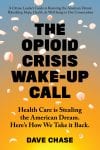Community Resource Center
Proven strategies to combat the opioid crisis for employers, citizens and community leaders
The opioid crisis is ravaging communities across the nation. Yet some areas have managed to cope with the epidemic better than others. In those communities that have demonstrated opioid resilience, we find a few common factors:
- Broad access to high-quality primary care;
- A regional business climate that offers distributed economic opportunity;
- Robust funding of local healthcare options and programs that boost Social Determinants of Health;
- Treatment options for individuals who are already suffering from addiction.
All four of these factors must be part of any robust opioid resilience strategy. Treatment for those already afflicted is important, but communities must address the upstream causes of addiction if they want to reverse this epidemic -- not just slow its spread.
Employers
The dollars of employer-funded health insurance, funneled into a broken system, have provided the resources needed to fund the astounding growth in opioid prescriptions.
Community leaders / policy makers
The solutions are out there – it’s up to community leaders and elected officials to find, promote and adopt them in ways that address their own local needs and contexts. As employers themselves, they must also lead by example with their own employee health benefits that often exacerbate the opioid issue.
Citizens
America has a national healthcare problem, but the solutions are going to come from local citizens fed up with the status quo.

A Guide to Restoring the American Dream: Rebuilding Hope, Health, & Well-being in Our Communities
The widespread overprescription and abuse of opioids has become the single most visible symbol of the U.S. healthcare system’s failure.
Creator and co-founder of Health Rosetta, Dave Chase, recently released The Opioid Crisis Wake-Up Call: Health Care Stole the American Dream. Here’s How We Take It Back, providing comprehensive, yet simple, fixes to our broken health care system.
This is a must-read for any business leader tasked with providing high-quality healthcare to employees. Chase delivers a compelling account of what we've been doing wrong with benefits purchasing, and how we the people, not Washington elites, can solve the opioid crisis.

The Opioid Crisis Wake-up Call is the first book to look at the upstream conditions that enable the crisis and the practical and proven approaches to solving this great crisis.

A fresh perspective from one the one of the most brilliant minds in health care. Chase is not beholden to any of the [industry's] giant stakeholders. The result is a uniquely honest and novel conversation about what’s best for America.

No one has been able to connect the key policy dots among our most pressing challenges in healthcare---the opioid crisis, value-based purchasing, and the critical role played by employers, until David Chase.

The Opioid Crisis Wake-up Call should be required reading for anyone working to engineer a better US health care system.

Get involved
Improve your benefits
Start down the path to 20-40% lower costs & better benefits, whether you have 100 or 100,000 employees.
Become a member
We help mission-aligned groups and people learn, connect, advance goals, and scale healthcare's fixes.
Get certified
We help benefits advisors stand out through transparency, expertise, and aligned incentives.
